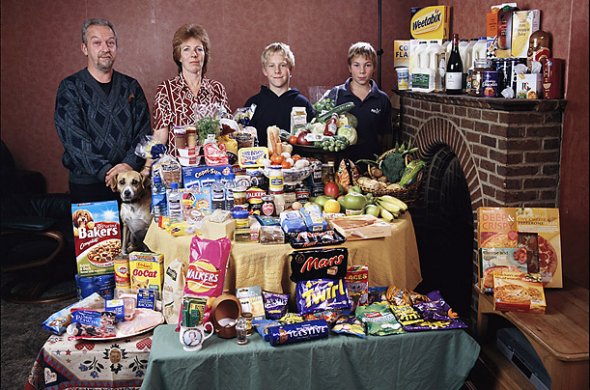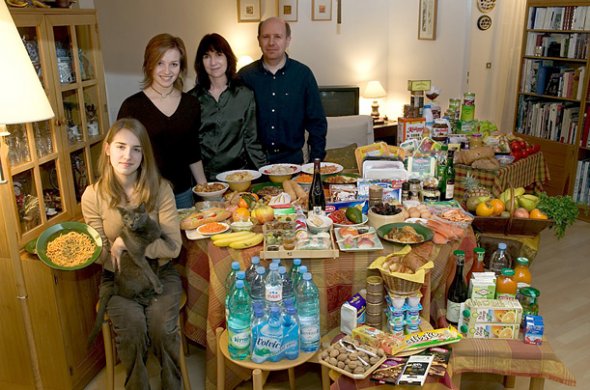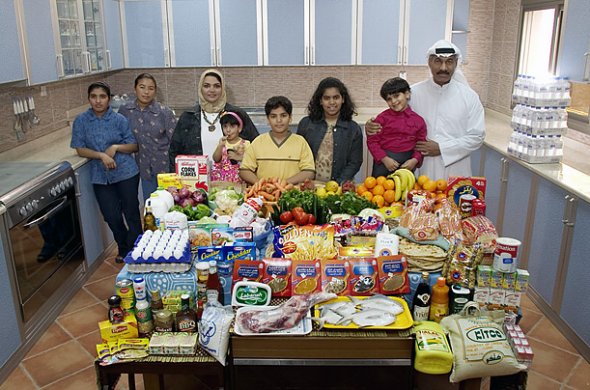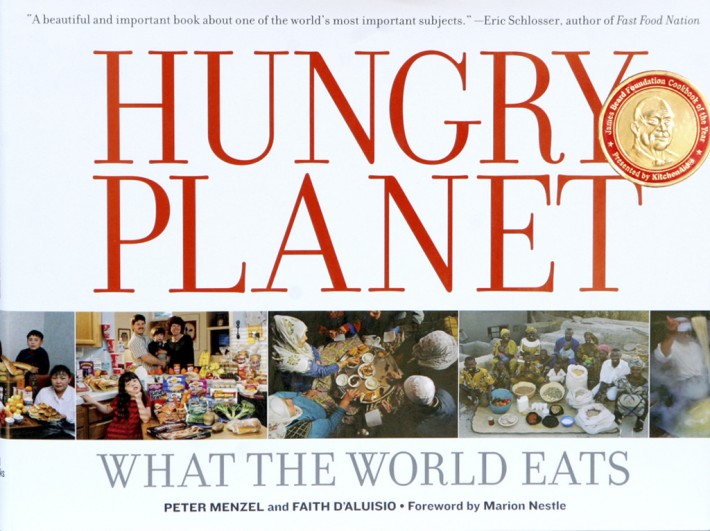It seems as a people, we have a fascination with photographing our food. From Henry's series of riders, to looking on instagram we cant help but document what we consume. Photographer Peter Menzel started this intriguing series of one weeks of groceries from around the world, taking traditional food photography to a much larger scale. In his book Hungry Planet, Peter explores both the cultural differences of diets around the world as well investigating how prosperity and poverty influence the diets of different nations.
Here is the book description of Menzel's amazing project:
The age-old practice of sitting down to a family meal is undergoing unprecedented change as rising world affluence and trade, along with the spread of global food conglomerates, transform eating habits worldwide. HUNGRY PLANET profiles 30 families from around the world--including Bosnia, Chad, Egypt, Greenland, Japan, the United States, and France--and offers detailed descriptions of weekly food purchases; photographs of the families at home, at market, and in their communities; and a portrait of each family surrounded by a week's worth of groceries. Featuring photo-essays on international street food, meat markets, fast food, and cookery, this captivating chronicle offers a riveting look at what the world really eats.

Mexico

Great Britain

USA

Australia

Germany

Italy

Canada

France

Japan

China

Poland

Kuwait

Mongolia

Turkey

View the entire series Here in Menzel's Book Hungry Planet.
If you're passionate about taking your photography to the next level but aren't sure where to dive in, check out the Well-Rounded Photographer tutorial where you can learn eight different genres of photography in one place. If you purchase it now, or any of our other tutorials, you can save a 15% by using "ARTICLE" at checkout.








it's kind of hard to see, but with the gallon of milk there are 2 gallons of water
The focus here was what items were bought as part of household groceries. Not all people in all countries would need to buy water, most American households probably drink tap water.
There are 2 gallons of water and a sink....
Look again.
That may be because they drink tap water.
Of course, in the USA you have clean water to drink fro the tap, no ned to buy it !
Yes there is. They have a couple gallon jugs in the back, next to the milk and Budweiser.
Because we can get water from the tap or is that concept lost on you?
Don't mean to stereotype, but.....blacks in America eat a LOT of junk food. I see them in the grocery store with their carts filled with soda, cereal, candy and anything that comes in a colorful package. Plus lots of Burger King, McDonalds, etc
A lot of whites eat this way too (mostly the lower IQ ones) but there are also millions of people in America who eat healthy food, shop at Whole Foods, etc... it really comes down to intelligence. The smart people eat smart, the dumb people eat dumb.
You basically just said blacks in America have low IQ's. You, sir, are quite uncultured. There is a lot that goes into health and healthy eating besides IQ. Actually, IQ really isn't the factor. It's education. Generally, those with more education tend to be in better health, but just because you aren't as educated as some others doesn't mean you have a low IQ. Your statement, "smart people eat smart and dumb people eat dumb" is alarming and represents the closed-minded views many oblivious/privileged Americans possess. You should try reading up on the socio-contextual determinants of health to become a little more cultured about these types of issues before speaking on them.
You should also consider socioeconomic status, income, availability of healthy/fresh foods, access to transportation to get to said foods, etc. Someone living in poverty or on a fixed income cannot afford to shop at Whole Foods. If they live in a rural or poverty-stricken area, the nearest health food store may be miles away, and they can only purchase what they can afford. You have to start looking at things from a broader perspective and not just from the perspective of how YOU see things based on your experiences.
*like
Very well stated! If only we could have a bigger influence on the spoiled and self-absorbed,...the racism and bigotry would not be so prevalent.
I'm not agreeing or disagreeing to the OP, but I will say that it was not racist. Anyone who claims that it was racist is a racist yourself and only trying to beat the beehive. There are differences between races and that's normal. Calling attention to these is not racist. Also, Krissy Williams, you pulled the blacks = low IQ out of your hind-end. If only you'd pull your head out of it, too. Quit being so hypersensitive. Maybe YOU should look at things from a broader perspective.
You don't have to shop at Whole Foods to be healthy. Every grocery store has fruits and vegetables.
Not racist? Could have fooled me.
Well, good day to you, too! First, the word "racist" was never once used in my response to Mr. Steven. I didn't mention racism at all. I only made a logical conclusion based on the statements he made. He said blacks in America eat unhealthy, people who eat unhealthy have low IQ's, therefore, wouldn't you logically conclude that he's saying blacks in America have low IQ's? I don't know that man well enough to know if he's racist, just ignorant of other cultures, or both. And neither do you. That's the word I used: uncultured, not racist. But since racism is the belief that one race is inherently inferior, one would think that saying black Americans have low IQ's is a bit racist, no? I mean, now that you mention it, but only because YOU mentioned it. :)
Second, you're correct. I don't know everyone in America to know whether or not many are closed-minded and oblivious, but nowhere in my comment did I say that many people in America were. What I said was that of those who are oblivious/privileged (oblivious meaning unaware), his views are similar to those that many of THEM have, which tend to be closed-minded because they are unaware. Completely different from saying many Americans are closed-minded.
I'm looking at things from the perspective of a public health researcher since that is my field of study. Transportation, income, and socioeconomic status, or the lack thereof, are HUGE factors in whether or not someone has access to and can AFFORD fresh/healthy foods, not whether or not the grocery store carries fruits and vegetables. I'm not even sure what you were trying to say with that statement because it didn't make any sense. Someone's socioeconomic status doesn't affect whether or not the grocery store has fruits and veggies, it affects whether or not they can afford to purchase them at said grocery store when they can get more food that is less healthy for the same price. You just decided to pick and choose certain things out of my comment to make your point instead of actually using everything I said in context. For whatever reason, I think you just felt passionate about this topic, maybe because you share the same views as Mr. Steven, I don't know. Nothing I said was hypocritical. Simply, one should become more aware of issues that the underprivileged people in America face before making a statement generalizing ALL people from that group. I hope this helped you understand a little better. Have good day! :)
Too True. However, food is a Cultural thing and bad eating habits are passed on to children. Nobody likes being told what to eat, so I look at it as free choice
Mamma made
me a Sammy so I ate it.
Nice, well-reasoned response.
Rock on girl. I do take exception to the transportation thing--anybody can get there. Cities--please. So easy. Even if you're walking. Live in the country? Grow it. [Live in the city? Grow it.]
Well put, I'm so sorry, you had to answer to this person anyways...People; Could you stick to the article? yeah, the point! North American regions seem to eat more processed food...than any other nations! They eat fruits, vedgetables, and yes, fish and meats! only...have a second look, and yes, eventough these are staged, they still represent more or less how these nations eat...So yes, we need to take a look at ourselves in this...and try and eat/drink produces of nature, not industries...
Stupidest comment ever!
"Intelligence" is not a good word. "Ignorance about healthy eating" is better. They simply don't know (and have never been taught) that even though you get less for your money when you buy healthy, you have less cravings and the food is more satisfying. Corporate media has a hold on our public school systems, so that's what the kids see and want. --- “Everybody is a genius. But if you judge a fish by its ability to climb a tree, it will live its whole life believing that it is stupid.” quote by Albert Einstein
it comes down to the money not smarts there are smart people that eat crap cuz its affordable and accessible and yes whole foods is UNasscessible to some people in the us with out money/transportation
"Don't mean to stereotype, but" doesn't save your arse when you're following it with a stereotype. Often choosing unhealthy foods relates to low income, not intelligence. Seems to me you're the one lacking in intelligence for making such ridiculous assumptions!
I am a black American and I went shopping today. I spent $120 on fresh fruit, fresh veggies, cheese, milk, yogurt, turkey sausage, two boxes of Kashi cereal, whole wheat bread, couscous, turkey, chicken breast, and 100% juice. No processed foods, no soda! I do realize that most blacks don't eat like this but I do! I had to learn to do better for my family and cut out fast food and un healthy processed food.
Kashi has more sugar than "Krave" chocolate cereal if you can believe it! What a scam!
I'm always astounded by how little sugar "sugary" cereals, like Krave, have compared with "heathy" cereals and other health snacks. Sometimes eating Lucky Charms for breakfast is not such a bad option.
Regular Cheerios is where its at!
It may have more sugar but it also has more fiber and more protein. I guess it's what is more important to you at the time.
Kashi Go Lean (my favorite) has 9 grams of sugar. Krave has 11, according to the company website. I don't know about the other Kashi cereals, but I like the Kashi brand in general.
Kashi is a processed "food"...
I'm aware of that. I just thought it was a better choice for my children than the apple jacks they were begging for. At least it has fiber. I am trying to do better and it's a process. It won't happen overnight. I'm just proud I didn't buy the box Mac and cheese, canned ravioli, and canned fruit like I use to buy.
You're right, it is a process and I applaud your enlightenment. We can all make little changes here and there that are not costly ( water instead of soda ... ) and that can have a big impact on our health and well-being. It's not always easy because our lives are so hectic. That can of ravioli sure makes your life easier at times, so cut yourself some slack and use it for "emergencies" :-). But seriously, it is doable and it is great when the kids get involved in their food preparation.
And that is the difference between SMART AND Dumb, fast, canned foods and not really that much faster to prepare for good for emergencies and read the ingredients in the can before you recommend. There are much healthier choices of food for "emergencies."
You know, in a perfectly well oiled life machine, all our meals would be made from the purest, freshest ingredients. Who wouldn't want that ? However, I have come to a life experience conclusion that things don't always work out that way. I don't "recommend" canned ravioli, I was referring to the previous poster's reference to it. I also beg to differ that a made from scratch meal is that easy. Firstly, you must have all ( or most of ) the ingredients at home and then you need to prepare it : cleaning, chopping and cooking. Of course, that often leads to extra dishwashing. What I'm saying is that sometimes, you're not 100% organized, 100% of the time. Quite frankly, there have been evenings when that extra 10 minutes of kitchen work would have killed me. But I hear what you're saying :-)
True, and I applaud you for that :) it is always important to do something as you inch towards better health than doing nothing! especially since you have little ones to set an example for
Yes, and so is whole wheat bread, and, at some level, so is juice. Still, Karema is doing pretty well.
Most blacks??? You just stereotyped your own people with that comment. I think it's more so people in general rather than "most blacks."
I only said most blacks because I was answering the poster above when he made a comment about how "blacks" eat. I was saying to him not all black people eat like this and it had nothing to do with race. It has to do with how you were taught and making a conscience decision to do better. I think that they were showing how Americans eat in general not just a black family and I was insulted that he made it about blacks. I said I realize that most blacks may not eat like me bc that is my truth. That is what I see where I live. As I'm shopping I see a cart full of things that are in that picture! I'm just saying that sometimes in our community we don't talk about how to eat healthy. There is a lot more education coming to these areas to share the information. For example my sons school is having an 8 week program of how to cook healthy. It's a free course where they also tell you how to shop smart on a budget. I live in an area that is predominately Hispanic. The stores seem to only offer what they think they will buy. The vegetables and fruit are always old and beat up, and the meats are questionable. They assume that most people in that area are uneducated and poor and will buy what's in front of them. When I was younger that is where my mom shopped bc it was close and convenient. I want to teach my children better than what I was taught. My mom broght most of stuff in the picture! She also cooked unhealthy and I didn't learn better until I had children and attended culinary school. So now I leave my community to shop because I know better. I know that just because it's cheap doesn't make it good for me. I see that the foods are fresher. The stores are cleaner and they offer more healthy choices.
Actually Karema Rogers milk, cheese, ,yogurt, turkey sausage, chicken breast, whole wheat bread, kashi, couscous, turkey and the 100% "juice" are processed, some that's mention is highly processed, you don't even know it. Please do your research. Check out the website nutritionfacts.org
Fuits and veggies (plant foods) are what is found in nature They're 100% natural if not sprayed by us with chemicals .
We are the only species that get cancer, health problems because of our lifestyle of choice and diet. The non-human animals that do get sick are the ones that eats man-made "foods".
So you imply that black people in the USA are dumb......you are an idiot
You, sir,appear to be eating a LOT of junk food...and therefore...
What an ass.
In GENERAL (meaning Blacks, Whites, Asians, Latinos, etc), people in poverty consume junk food because its cheaper. When you have limited income, you'll get more out of your $10 at McDonalds than you would Subway. You can feed the family at McDonalds versus rationing the food with Subway. There are research and studies out there that talk about this.
It isn't a matter of IQ or intelligence. It's survival. Spending what little you have on more expensive, healthier food isn't smart. Those of us in a higher tax bracket can afford these things because our extra income allows it. Back in college I ran to McDonalds, Ramen noodles, and hostess cakes because I got more out of the little I had. Now? I've made healthier choices because my dollars stretch a little further.
The smart people eat what they can afford and live within their means and the bigger companies capitalize on this. Why do you think it costs $.99 for a bottle of Coke and $1.99 for Aquafina? If you've got $5 in your pocket and want to grab lunch, what are you going to go for if you have to make that stretch? Sounds pretty intelligent to me.
Maybe you should do some more research before making a fool out of yourself. You just sound ignorant---stupid even.
It's not really a matter of survival either, it's laziness and using survival as an excuse for poor eating habits. If you're really that poor, then why not cook at home instead? Find some budget recipes on taste.com.au, go to your super market and buy your ingredients and whip up dinner for the whole family. You don't need to buy premium ingredients either if you are that tight.
Also, eating healthy is actually the smart way to go. You may not see this however because it's very hard to perceive its benefits in the short term, but if we're talking about feeding children, then parents should try harder to ensure they will lead a healthier life style.
The smart people eat smart? All I can say is, you have not looked inside a college dorm refrigerator. IQ has nothing to do with it.
And economics don't lie- shopping at Whole Foods is definitely an economic privilege that not even my middle class family can afford. But when you think about it, shopping at Whole Foods isn't that smart- it's just an easy way to eat healthy. What REALLY takes smarts is shopping for healthy food on a tiny budget - and how many Americans have the time or energy or awareness to do that?
People need a giant media detox and a radical shift in how we perceive "healthy food" if we are to start healing our bodies.
How could people Detox? It would be a good thing I reckon. I visited the USA for 3 months and found the media promotion of food almost suffocated me, it was so different from Australia. I sure wanted everything that is advertised but I knew I didn't need everything and I saved a lot of money. I was actually pleased to be coming home. Nice place to visit....
Ha. I believe it. Australia may have its own issues but as a whole I'm very fond of all the people I've met from there.
Anyway- you hit a very important point when you said "I sure wanted everything...but I knew I didn't need everything," because I believe AWARENESS is a big part of the detox. It's one thing to be bombarded by ads, it's quite another to be bombarded but aware that you're being bombarded. We can't change our surroundings (at least not very easily), but we can change how we relate to them. That, coupled with watching less TV and reading fewer national newspapers would help a lot of people, too. Even taking occasional media-black out days where you don't go on the Internet or turn on the TV or (hardcore) don't even look at your phone. I can say from personal experience that it's hard, but not impossible, and ultimately will benefit your mental AND physical health :)
Most of the time Low Income and Poor make bad food choices simply because it is usually cheep and fills them up. In many cases For decades, low-income communities of color have suffered because there are not Markets where they can make proper choices. There is a large gap in who has access to good food. Low income communities suffer more from diet related diseases obesity and diabetes than those in Higher income communities with easy access to Good food such as fresh fruits and veggies.
It doesn't come down to intelligence. It comes down to economics. The overwhelming majority of Americans cannot afford to shop at Whole Foods. They must bargain shop just to be able to purchase enough food to feed their family. They cannot pay outrageous prices for organic food at Whole Foods and other "luxury" supermarkets.The really sad reality is that in the USA packed process foods are more affordable than healthy food and fresh fruit/vegetables. Try spending $100 at Aldi, Wal-Mart or a discount (Bent and Dent type) of store. Then try to buy spend that 100 at Whole Foods. You'll walk away with a vastly different amount of food. Thats what most people are trying to get; the amount of food necessary to feed their family for the week for the funds they have.
Also, Whole Foods and similar supermarkets are not part of every community. I'd have to drive 2 hours to get to the nearest Whole Foods and further to find a Trader Joe's.
If you sold all the items in pic from the US, could you afford the items on the French picture? I think they would be able to afford them. We can afford to eat better in the US, but we eat too much.